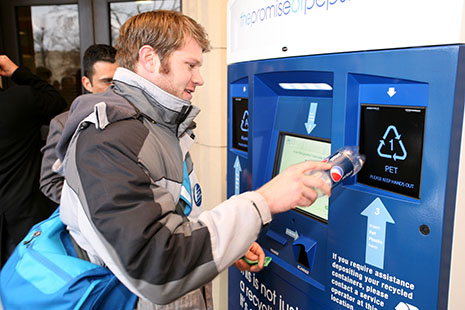FAYETTEVILLE, Ark. – The University of Arkansas officially unveiled the campus’ first computerized recycling receptacles – also known as Dream Machine kiosks – in the Arkansas Union Wednesday morning. As part of the Dream Machine® Recycling Initiative, thousands of these interactive kiosks and recycle bins have been introduced at popular public locations across the United States.
Two Dream Machine kiosks, now at the Arkansas Union, allow students and faculty to earn points for every bottle or can recycled and to redeem those points for local discounts on entertainment, dining and travel.
“The Union is excited to be the first place on campus where the Dream Machines are located,” said Sue Smith, associate director of the Arkansas Union. “We continue to lead the way in sustainability on campus, and our partnership with PepsiCo is furthering this goal.”
Additionally, the more bottles and cans recycled through the program, the more support PepsiCo will provide to the Entrepreneurship Bootcamp for Veterans with Disabilities, a national program offering free experiential training in entrepreneurship and small business management to post-Sept. 11 U.S. veterans with disabilities.
“We’re excited to expand the Dream Machine Recycling Initiative to the University of Arkansas and create more recycling opportunities for their students and faculty” said Tim Carey, PepsiCo’s director of sustainability. “Recycling in a Dream Machine is a fun and easy way to earn rewards, making a real difference for our planet and in the lives of disabled veterans.”
During the official unveiling, Danny Pugh, vice-provost for student affairs and dean of students, spoke about the importance of recycling for the campus, community and the world.
Cathryn Fleener, a university student and chair of the Arkansas Union Advisory Committee, spoke on behalf of university students about the duty of current and future students to work toward a greener campus and a greener world. PepsiCo representative, Chris Weber, spoke about the importance of building this bridge between the University of Arkansas and PepsiCo to help promote a more Earth-friendly outlook. Carlos Ochoa, program manager for the office of campus sustainability spoke about the Dream Machine Recycling Initiative as another one of the university’s many steps towards a greener tomorrow.
Even though recycling just one ton of plastic bottles saves approximately 3.8 barrels of oil, less than 33 percent of all plastic beverage containers are currently recycled each year. Recycling a single aluminum can conserves the equivalent energy required to light a 100-watt light bulb for almost 20 hours.
PepsiCo’s stated goal with the Dream Machine Recycling Initiative is to help increase recycling rates to 50 percent across the country by 2018.
About the Dream Machine
The Dream Machine Recycling Initiative, introduced on Earth Day 2010, has made thousands of new recycling kiosks and bins available in popular public venues such as gas stations, stadiums, and parks with the aim to increase the U.S. beverage-container-recycling rate. Dream Machine kiosks are computerized receptacles that include a personal reward system that allows consumers to collect and redeem points for each bottle or can recycled. To learn more, please visit www.facebook.com/DreamMachine.
About PepsiCo
PepsiCo is a global food and beverage leader with net revenues of more than $65 billion and a product portfolio that includes 22 brands that generate more than $1 billion each in annual retail sales. Our main businesses – Quaker, Tropicana, Gatorade, Frito-Lay and Pepsi-Cola – make hundreds of enjoyable foods and beverages that are loved throughout the world. PepsiCo's people are united by their unique commitment to sustainable growth by investing in a healthier future for people and the planet, which they believe also means a more successful future for PepsiCo. PepsiCo call this commitment Performance with Purpose: PepsiCo's promise to provide a wide range of foods and beverages for local tastes; to find innovative ways to minimize its impact on the environment by conserving energy and water and reducing packaging volume; to provide a great workplace for its associates; and to respect, support and invest in the local communities where they operate. For more information, please visit www.pepsico.com.
Follow PepsiCo:
About the Entrepreneurship Bootcamp for Veterans with Disabilities
The Entrepreneurship Bootcamp for Veterans with Disabilities is a program created at the Whitman School of Management at Syracuse University and operated under the auspices of SU’s Institute for Veterans and Military Families, designed to provide training in entrepreneurship and small business management to post-Sept. 11 veterans with disabilities resulting from military service. The mission of the bootcamp is to open the door to business ownership for veterans, by developing skills that relate to the many steps associated with launching and growing a small business. Today, the Entrepreneurship Bootcamp for Veterans with Disabilities is offered through a national consortium of world-class schools across the country, which includes Syracuse University, Texas A&M University, Florida State University, UCLA, Purdue University, University of Connecticut, Cornell University and Louisiana State University. The training is provided at no cost to qualified veterans.
Topics
Contacts
Scott Flanagin, director of communications
Division of Student Affairs
479-575-6785,
Steve Voorhies, manager of media relations
University Relations
479-575-3583,
